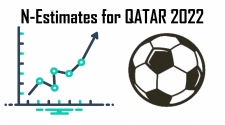
Quintessa mathematicians and scientists enjoy analysing numbers. Over the last few months, Simon Rookyard and Jodie Stone have further enhanced Quintessa’s algorithm for sports team rating and result prediction that was used to predict results for the UEFA Euro 2020 competition. It will be put through its paces during the upcoming FIFA World Cup - Qatar 2022.
In late 2019, Quintessa reported the development of a novel algorithm (“N-Estimates”) to assess the overall standard, or “rating”, of a sporting team. As well as calculating a team’s rating, the approach can be used to predict upcoming results. It was last used to predict the results of the UEFA Euro 2020 competition. With the FIFA World Cup starting on 20ᵗʰ November 2022, we’ve taken the opportunity to develop the tool further and apply it to the first round of the competition.
The N-Estimates algorithm uses a mathematical model that is tuned to historical results and considers effects such as home advantage and opposition strength. Using this, the algorithm arrives at an average “rating” for each team (in more detail, a probability distribution of how well the given team will perform on a given day). When predicting match results, the ratings of the two teams are converted to a probability distribution of goal difference before an analysis of the two teams’ previous results determine the probabilities for each possible scoreline. The most likely scoreline (accounting for the probabilities of both the number of goals scored and the goal difference) is hence taken as the predicted match result.
Over the last couple of months, a selection of updates to the algorithm have been considered and, where reasonable, implemented. There have been two main improvements: the first an adjustment to the goal difference uncertainty calculations and the second the implementation of continent specific home advantage coefficients. With the data set having also been expanded, a comparative residual analysis was undertaken. It was shown that home advantage was much stronger in Asia, and similarly in Africa, although to a smaller effect. For intercontinental matches, a variety of home advantage approaches were considered – the approach giving the best predictions for the training data set was found to be taking the maximum of the two relevant home advantages coefficients.
In the opening stage of the tournament, teams will be competing in eight groups of four. Each team will play the other three teams in their group giving a total of six matches per group. There are hence 48 results to predict.
The prediction plots (given below) indicate the likelihood levels of various possible results. The x- and y-axes represent potential numbers of goals scored by the "home" and "away" teams respectively, with the home wins below the diagonal blue dashed line and away wins above. The colour of the plotted points denotes the probability of each given scoreline – this is scaled, with a high probability plotted in orange and a low probability in blue. The plotted scoreline embellished with a cross denotes the most likely result. The solid orange line represents the most likely difference in performance between the teams during the match, expressed as a goal difference (as this is based on non-integer mean ratings for the two teams, it is not necessarily an integer value). The 1σ uncertainty range for this predicted goal difference is given by the two dashed orange lines. Predictions will be added throughout the group stage to allow the results of earlier matches to be taken into account. Who will be group winners? The algorithm currently thinks it will be good news for the Netherlands, England, Argentina, France, Germany, Belgium, Brazil and Portugal.
















































Quintessa is not affiliated in any way with FIFA. Its application of the N-estimates algorithm to the FIFA World Cup 2022 competition is an independent and non-commercial endeavour.
After its initial publication, this article has been updated to add extra predictions as follows:
- 24ᵗʰ Nov, 2022: Qatar vs Senegal, England vs USA, Netherlands vs Ecuador, Wales vs Iran, Argentina vs Mexico, Saudi Arabia vs Poland, France vs Denmark and Australia vs Tunisia.
- 25ᵗʰ Nov, 2022: Spain vs Germany, Belgium vs Morocco, Costa Rica vs Japan, Canada vs Croatia, Portugal vs Uruguay, Ghana vs South Korea, Brazil vs Switzerland and Serbia vs Cameroon.
- 28ᵗʰ Nov, 2022: Qatar vs Netherlands, Ecuador vs Senegal, Wales vs England, Iran vs USA, Argentina vs Poland, Saudi Arabia vs Mexico, France vs Tunisia and Australia vs Denmark.
- 30ᵗʰ Nov, 2022: Spain vs Japan, Costa Rica vs Germany, Belgium vs Croatia, Canada vs Morocco, Brazil vs Cameroon, Serbia vs Switzerland, Portugal vs South Korea, Ghana vs Uruguay.